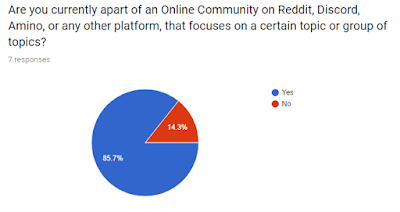Along with this project, I did a survey to help prove my points and gather information that would help me with the project. I posted a link to the survey on a good majority of my Social Media pages like Amino and Twitter to get as many people to the survey as possible. In the end, 7 people responded to the survey. Here were the results of that survey:
NOTICE: ALL RESPONSES TO THE SURVEY WERE ANONYMOUS. I DO NOT KNOW THE IDENTITIES OF THE SURVEY RESPONDENTS.
Question 1: Are you apart of an online community that focuses on a certain topic(s)?
Only one of the seven respondents of this survey said no to this question. This question was used mainly as a demographic question.
Question 2: Why do you usually join an online community?
This was a question where people had the ability to choose multiple answers. Everyone who responded to this question said that they mainly join a community to make friends. Five people said that they join an online community to find people with similar interests. Two people say that they join a community to gain new information on a topic. One person said that they join communities to share opinions on a topic.
Question 3: What platform would you most likely use?
This was another question in which multiple answers could be chosen. Five of the respondents said they would use Discord to join an online community. Three people said they would use either Twitter, Reddit, or Amino. Two people say they would use Instagram. One person said they would use Tumblr.
Question 4: How much do you like/dislike being in a community?
Respondents were given a scale from 1 to 5 to rate how much they like/dislike being in an online community. One person rated it a 1. Another person rated it a 3. Five other people rated it a 4.
The Online Community Lifecycle
In my school project and survey, I described the lifecycle of online community membership as follows:
- Lurker: (Pretty self explanatory; Someone who doesn't contribute to the community and 'lurks')
- Newbie: (Someone who's relatively new to contributing to the community)
- Regular: (Someone who posts regularly in a community)
- Leader (Someone who has reached 'celebrity status' within a community or someone who moderates a community)
- Elder (Someone who is preparing to leave a community based on changes of interests, relationships, etc.)
Question 5: What stage of the lifecycle are you at?
Respondents were asked what stage of the lifecycle they were currently at within the community they were most active in. 3 people considered themselves Lurkers. Two people considered themselves Newbies. Two other people considered themselves Regulars.
Question 6: What stages of the lifecycle have you experienced?
Respondents were asked what stages of the lifecycle they have experienced personally. Six respondents said that they've experienced the Lurker and Regular stages. Five said that they've experienced the Newbie stage. Two have said they've experienced the Leader and Elder stages.
Question 7: Is this lifecycle accurate?
Respondents were asked if the lifecycle described was accurate to how people enter, interact, and exit a community. Only one of the seven respondents say that the lifecycle was not accurate, while the remaining six respondents said that it was accurate. People were asked to explain their answer, but all respondents declined to comment.
Question 8: Have online communities changed your commitment to IRL socialization?
Respondents were asked if a commitment to an online community has ever drastically changed how they interact with people in real life. Four people said that it didn't. Two people said that it did. One person was unsure.
Question 9: Do you agree that people can form lasting relationships online?
Respondents were asked if they agreed with the statement "Online communities can help bring people together and make long, lasting relationships." Three people said that they slightly agreed with the statement. Two people said that they strongly agree with the statement. One person was neutral about the statement. One person strongly disagreed with the statement.
Question 10: Do you agree that you must be careful with who you trust online?
Respondents were asked if they agreed with the statement "You must be very careful with who you trust in an online community." Four people slightly agreed with the statement. Two people strongly agreed with the statement. One person was neutral about the statement.
Additional Comments from Respondents
People were asked at the end of the survey to give additional comments about online communities. Only four people gave additional comments.
One person said that "Online communities are great but there may be a downside to them, in which they could also be toxic."
Another person said that online communities could cause damage to one's mental health, citing cyberbullying.
The person who strongly disagreed with Question 9's statement said "Show me just one person who made a lasting friendship on the Internet. Impossible, isn't it?"
Finally, another person said that "Online communities are great but there may be a downside to them, in which they could also be toxic."
Conclusion
The results of the survey helped me out a lot not only with my school project, but in helping me understand how other people felt about online interaction. I hope that the results of this survey can benefit others with their research or with understanding why people like/dislike online communities.











No comments:
Post a Comment
Note: Only a member of this blog may post a comment.